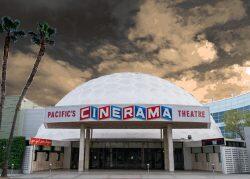The century-old Metropolitan Theatres has gone belly up, with theater lease agreements in Los Angeles, Santa Barbara and beyond open to question.
The Los Angeles-based movie house chain filed for Chapter 11 bankruptcy after ticket sales at 15 locations in California, Colorado and Utah this year fell 20 percent, Bloomberg and CoStar News reported.
The family-owned theaters, which in 1923 opened the Broadway in Downtown L.A., has joined other cinemas seeking bankruptcy protection after being hit hard by the pandemic, at-home streaming and fewer theater film debuts.
Metropolitan is rethinking its real estate portfolio, including 10 theaters in California, half of them concentrated around Santa Barbara, including the historic Arlington Theatre. It also operates theaters in Huntington Park, south of Downtown, as well as San Clemente and Calexico.
The Beverly Grove-based chain also operates three theaters in Loveland and Steamboat Springs, Colorado, and two in Park City, Utah.
The company said its lease agreements will either need to be modified or rejected as it works to streamline operations in light of declining big-screen demand. Last year’s Hollywood strikes were a further blow, because fewer film releases are expected through 2025, the company said.
Metropolitan is looking at leases “that would otherwise continue to be a drain on MTC’s business,” according to its Chapter 11 filing, which listed $26.5 million in assets and liabilities.
Metropolitan Theatres said it doesn’t have enough cash to make up for this year’s poor ticket sales without reducing rent at its remaining locations.
President David Corwin, in a sworn statement, also highlighted continued pressure from streaming as North American ticket sales are down 20 percent this year.
Corwin, whose family has owned Metropolitan Theatres since it was founded by Joseph Corwin in 1923, said the firm intends to use Chapter 11 to negotiate rent reductions with landlords and close locations it can no longer afford.
The firm pays about $2.6 million a year in rent, a cost he said continues “to be a drain.”
Metropolitan will use a form of Chapter 11 for small businesses that’s designed to be cheaper and faster than a traditional corporate bankruptcy, according to Bloomberg. The firm filed customer motions to continue paying ordinary business expenses, including wages for 240 part-time and 12 full-time employees.
The larger AMC Entertainment Holdings avoided bankruptcy during the height of the pandemic, but Regal Cinemas parent Cineworld Group filed Chapter 11 in 2022, closing 39 theaters. Other chains have either gone bankrupt or closed, including the former owner of the historic Cinerama Dome in Hollywood.
Last month, dozens of Hollywood filmmakers rallied to save the Fox Village Theatre in Westwood by buying it for $15.5 million.
In 2022, Grubb Properties bought the Laemmle theater in North Hollywood and plans to replace it with 128 homes.
Other theaters have been converted to new uses such as gyms or content creation studios, Gabe Kadosh of Colliers in Los Angeles said.
Read more
But larger theater buildings may be challenging to retrofit, Kadosh said. Tesla, for example, is demolishing the interior of a Los Angeles theater to convert it into a delivery hub and service center.
“It’s really a case-by-case basis” to figure out what’s next for shuttered theaters, Kadosh told CoStar News.
Last year, moviegoers spent $8.9 billion on movie theater tickets across the U.S., down from $11.2 billion in 2019, according to market tracker the Numbers. Last year’s ticket sales, however, were up $1.5 billion from 2022.
— Dana Bartholomew
The post Metropolitan Theatres files Chapter 11 to renegotiate cinema leases appeared first on The Real Deal.
Powered by WPeMatico



